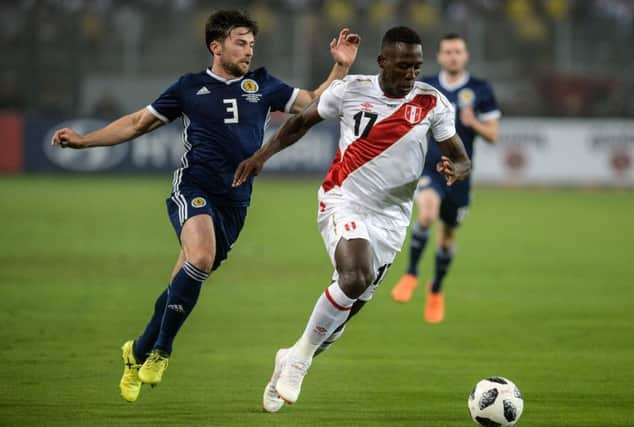Why are Scotland playing friendlies in South America and is the trip worth it?


But that was the case at 2am this morning, as a presumably small audience of diehards, insomniacs, and nightshift works tuned in to see Scotland soundly beaten 2-0 by Peru.
There were few bright spots in the defeat, although boss Alex McLeish, mandated to be glass half-full, saw several causes for optimism, including solid performances from Scott McTominay and Dylan McGeough.
Advertisement
Hide AdAdvertisement
Hide AdWe look at why Alex McLeish’s men find themselves half way around the world after the end of the domestic season, and crucial, whether it will all be worth it.
Warm-up Woes
It has now been twenty long years since Scotland qualified for a World Cup or a European Championship, meaning the team’s role in late Spring and early Summer is that of warm up opponents for teams bound for those tournaments.
In 2016, Scotland were beaten by both France and Italy as those two giants of World football prepared for the European Championships.
In 2014, Scotland held Nigeria to a 2-2 draw in a match in London.
Perhaps the most damaging of Scotland’s summer sojourns was an end-of-season transatlantic trip in 2012, when Craig Levein’s side were hammered 5-1 by the USA in Florida.
Why cross continents?
While the end-of-season games, even in the years that there are no international tournaments, have become traditional in recent years, there was no real explanation as to why Scotland chose to play Peru (and Mexico on Sunday evening).
For Scotland’s respective hosts, the benefits are obvious.
While Scotland are no longer considered to be a top team, it is common from teams from other continents to try and play friendlies against European teams ahead of a World Cup.
Both Peru and Mexico have two European teams in their World Cup groups in Russia, and Scotland might be seen as presenting a similar challenge to Denmark, who are in Peru’s group, and Sweden, who are in Mexico’s.
Advertisement
Hide AdAdvertisement
Hide AdAs for why Scotland chose to accept these friendlies, there are a number of reasons.
New boss Alex McLeish may have wanted a foreign base to work with his inherited players away from potential domestic distractions.
It could also have simply been that these were the only games that the SFA could secure ahead of next month’s tournament.
Has it been worth it?
To the meat of the matter, is the trip halfway across the world for two non-competitive games really worth it?
It might seem unfair to attempt to make a judgement on that only halfway through Alex McLeish mini-tour of the Americas.
However, even the build-up to the trip has given an indication of why it might have been better for Scotland to stay at home, or at least in Europe.
An experimental squad was to be expected, especially after some of the country’s best talent, such as Kieran Tierney and Andrew Robertson were deliberately left out after long seasons.
McLeish, however, was left frustrated by no fewer than six call-offs ahead of the games, including Celtic’s Stuart Armstrong.
Advertisement
Hide AdAdvertisement
Hide AdLast night’s game proved that it can be beneficial to blood new talent, as the aforementioned McGeough and McTominay proved.
However, these players, and youngsters like Lewis Morgan, could have easily waited for their debuts, even if it came in the competitive ‘Nations League’ games against Albania and Israel in the Autumn.
In all, barring a hugely unexpected win over Mexico, it seems that the South American sojourn must be seen as something of a failure.
If Alex McLeish can lead Scotland to a major tournament, such failures will be quickly forgotten.
If, however, McLeish fails to end the now decades long tournament doubt, many could look back on this trip as an indication of what was to come.
